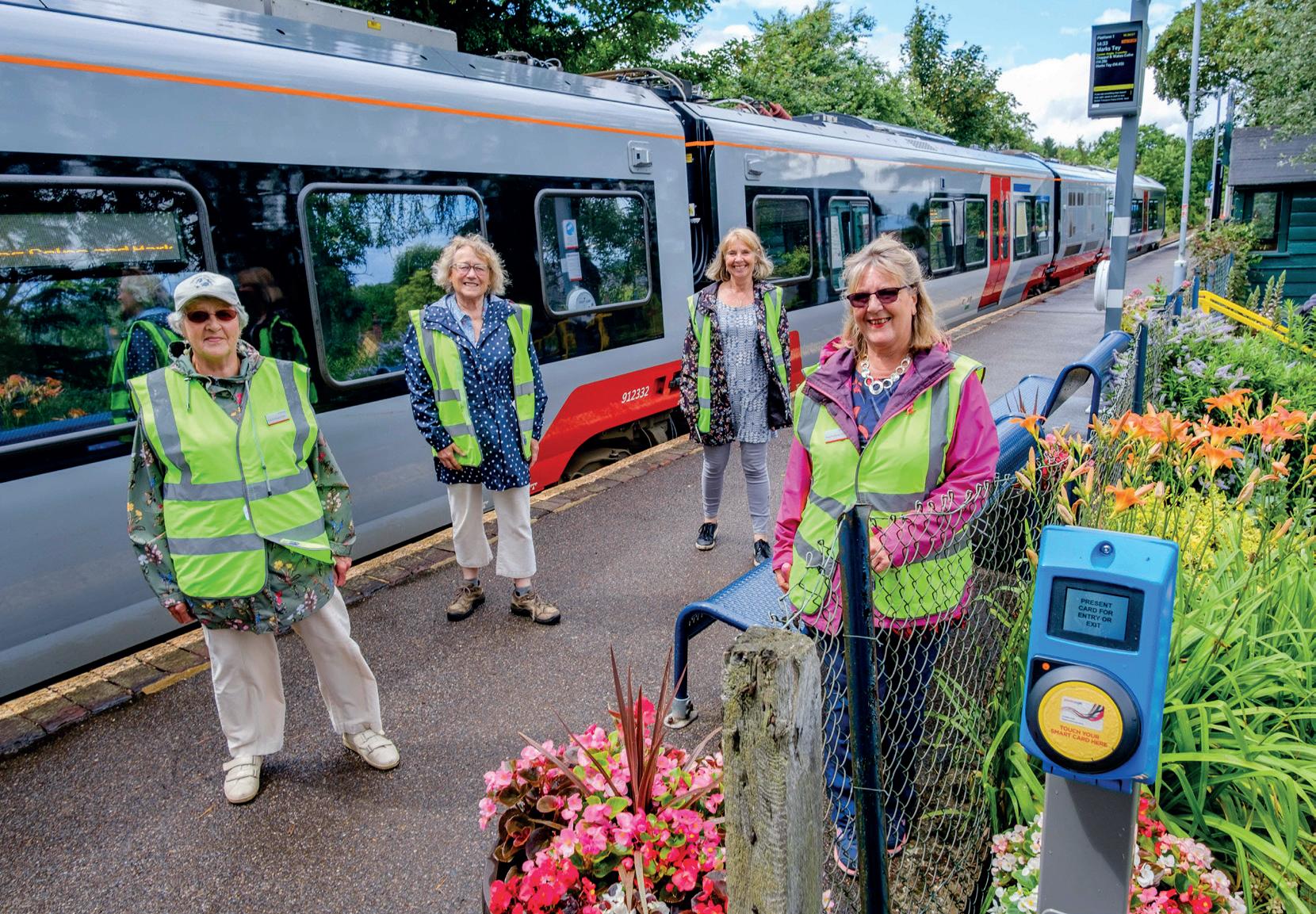







Forewords
An introduction to Greater Anglia and its role in breaking down barriers
Breaking Down Britain’s Barriers
Assessing Greater Anglia’s current impact against the Purpose Goals
Socio-economic Community Assessment
Analysis
Recommendations and Next Steps
Rt Hon Justine Greening, Chair of the Purpose Coalition and Former Secretary of State for Transport
Rail companies encourage connections in their widest sense. They transport people to their destinations for business and for pleasure, they link communities and open up access to opportunities. A well-run rail company has the potential to transform a region, improving its economic and social prospects while delivering a service that benefits its customers.
During my time as Transport Secretary, I saw for myself how good connectivity is critical for a government’s economic strategy, acting as a catalyst for growth. The recent HS2 debate has only served to highlight the economic and political imperative of consistency on major infrastructure projects. The transport sector - and the railway network in particular - is vital if progress is to be made on developing a sustainable and greener infrastructure that will provide the framework for long-term change. Its decarbonisation, digitalisation, and expansion will help to support economic growth, investment, and jobs for the future as well as value-for-money services.
As we reflect on a dramatic period in British politics, culminating in a new government, which has impacted the lives of so many across the country –the importance of purpose-led organisations has never been greater.
Rail can also have a transformational effect on social mobility. In many parts of the country, advantaged and disadvantaged communities are found alongside each other. That is particularly true of the area that Greater Anglia serves, where wealthier commuter towns are located near more deprived areas in rural communities, and seaside towns which have few opportunities. Those who live in these social mobility coldspots are far less likely to be able to access rewarding and skilled jobs and, as a result, tend to be less financially resilient and have poorer health outcomes.
Rail companies – like other businesses – must lean into the needs of the communities they serve, acknowledging their priorities and making them their own, if they are to make a difference.
This report highlights the ways in which Greater Anglia reflects those needs, featuring a wealth of best practice which benefits their customers and their communities, as well as their colleagues.
Driving through the transformation of its services and improving the way it operates is key to its long-term strategy and it has ensured that its customers and communities are at the heart of that. Its Community Rail Partnerships and its network of volunteer station adopters work with it to ensure that the rail market not only grows but does so while making local lines and stations a much stronger part of their local communities.
Better employment opportunities are also a key part of improving the region and Greater Anglia has the potential to build a talent pipeline that can make a significant contribution to its economic recovery. In a part of the country where there tend to be fewer skilled jobs, the training and development initiatives the company offers, particularly its extensive apprenticeship scheme, boosts opportunity. It is also seeking to attract all those with potential and increase the diversity and inclusiveness of its workforce so that it better reflects the people it serves.
As a greener transport option, the rail industry and its passenger and freight services have a crucial role to play in the transition to net zero, and Greater Anglia has set demanding targets for its environmental performance. As part of its work to build sustainable communities, it is also driving change in responsible procurement with an emphasis on using local businesses that benefit local economies.
In addition, the transformation in service quality and performance Greater Anglia has delivered through its new trains programme over the last five years shows how a better rail service can really provide benefits for customers, communities, wider stakeholders and employees alike.
This report offers a blueprint for good practice in the rail industry, a sector which can play an incisive role in delivering equality of opportunity into the heart of those communities who need it most. I hope that the examples featured here will inspire other rail companies, and the wider transport sector, to consider how they can also extend their social impact and spread opportunity.

Martin Beable Managing Director, Greater Anglia
As Managing Director of Greater Anglia, it is my privilege to contribute to this pivotal report on breaking down barriers to rail access. At Greater Anglia, we are acutely aware of the vital role that rail travel plays in enhancing the socio-economic landscape of the communities we serve. Railways are not just about transportation; they are about connecting lives, empowering communities, and fostering sustainable growth.
Over the years, we have embarked on a transformative journey to not only enhance the quality and reliability of our services but also to make rail travel more accessible and inclusive. We believe that mobility should be a right, not a privilege, accessible to all, irrespective of one’s background or abilities. This commitment is reflected in our extensive efforts to replace all our trains with a brand new fleet, enhance station accessibility, and foster a more inclusive travel environment.
Our collaboration with The Purpose Coalition resonates deeply with our core mission – to serve as a catalyst for positive change for all those who depend upon us and are affected by the railway we run.
In the aftermath of last year’s General Election, we have continued to commit to innovation, service upgrades and purpose-led action for the benefit of our customers, communities, colleagues and wider stakeholders across our network.
By aligning our operations with the Purpose Goals, we aim to address and dismantle the socioeconomic barriers that hinder access to opportunity. Whether it’s through our targeted community engagement programs, our strategic partnerships, or our dedication to sustainability, our goal is to ensure that our rail services are a vehicle for social good.
This report not only highlights our achievements but also sets the stage for further ambitious progress we plan to pursue. It underscores our unwavering commitment to excellence, equity, and environmental stewardship. As we continue to navigate the challenges and opportunities ahead, we remain dedicated to enhancing the lives of our passengers and the vitality of the communities we touch.
We have already enhanced the positive impact of the railway on the region we serve. Together, with steadfast commitment and collaborative effort, we can further transform the landscape of rail travel and create a more connected and inclusive Britain.
At Greater Anglia, we are acutely aware of the vital role that rail travel plays in enhancing the socio-economic landscape of the communities we serve.
Forewords

Nick Forbes CBE Chair of the Breaking Down Barriers Commission and former member of Keir Starmer’s Shadow Cabinet
As Chair of the Breaking Down Barriers Commission, I’m incredibly proud to introduce this comprehensive report. Our work is driven by a shared commitment to social equity and sustainability, in a critical year for Britain, aligning closely with the national agenda to enhance mobility and access across all sectors of society.
Transport is more than just a means of getting from one place to another; it is a fundamental
driver of social and economic inclusion. In our partnership with Greater Anglia, we have focused on transforming rail services into conduits of opportunity, making them more accessible and responsive to the needs of diverse communities.
This report reflects our dedication to these principles, highlighting innovative approaches and significant strides towards creating a rail network that serves everyone, regardless of their starting point in life.
Through the Breaking Down Barriers Commission’s work, we aim to challenge and inspire the employers to think creatively and act decisively. We believe in the power of transport to change lives by connecting people to places, jobs, education, and each other. Greater Anglia can play a further pivotal role in advancing this vision, implementing practices that not only meet current needs but also anticipate future challenges.
This report is a call to action. It invites all stakeholders—government bodies, private companies, and community organisations— to double down on their efforts to break down barriers to access and foster a more inclusive society. With sustained commitment and collaborative effort, we can ensure that our transport systems are not just efficient and sustainable, but also equitable and empowering.
I am proud of the progress we have made and energised by the possibilities that lie ahead. Together, we can continue to make a profound impact, paving the way for a transport network that truly lifts everyone toward greater opportunities.
We believe in the power of transport to change lives by connecting people to places, jobs, education, and each other. Greater Anglia can play a further pivotal role in advancing this vision, implementing practices that not only meet current needs but also anticipate future challenges.
From 2012 onwards, Greater Anglia (GA), embarked on a transformative journey to redefine rail travel in East Anglia. It faced challenges, including ageing infrastructure, operational hurdles, and ever-evolving customer expectations. However, GA has emerged as a true industry success story, pioneering innovative solutions and driving sustainable progress across the region’s rail network, in parallel with transforming the rail travel experience and delivering record-breaking and industry-leading punctuality.
Over the past decade, GA has delivered numerous customer-focused initiatives, deploying significant technological advances along the way. From the introduction of a complete fleet of new, state-of-the-art trains to deployment of the region’s first rail app, to extensive station upgrades, the operator has continually sought to improve the passenger experience while prioritising safety, reliability, and environmental sustainability.
At the heart of GA’s purpose is a commitment to service excellence. Recognising the central role of rail in fostering connectivity and opportunity, the organisation has pledged to deliver safe, clean, and punctual services that meet the diverse needs of its passengers. By investing in brand new rolling stock on all services, maintaining the highest safety standards, and leveraging cutting-edge technology - GA is delivering a seamless and enjoyable travel experience for all.
The organisation’s dedication to social impact also extends beyond its operational footprint, encompassing a broader commitment to fostering inclusive and sustainable communities. Through strategic partnerships with Local Authorities, business organisations, and community groups, GA has actively supported initiatives aimed at promoting economic growth, social cohesion, and environmental improvement across the region.
One of the hallmarks of GA’s transformative pathway has been its ambitious agenda for service improvement and modernisation. As part of its major upgrade programme, the business has transformed
its rolling stock fleet, replacing all existing carriages with brand new trains equipped with cutting-edge features to improve comfort, capacity, accessibility, reliability, and environmental performance. GA also prioritised station upgrades, digitisation initiatives, and sustainable procurement practices to ensure that its operations align with the evolving needs and aspirations of local communities.
GA’s proactive approach to sustainability extends beyond its operational practices to a holistic commitment to reducing emissions, minimising environmental impact, and fostering sustainable development. By tracking and mitigating its carbon footprint, implementing energy-efficient measures, and engaging with stakeholders to promote sustainability – GA is driving positive change and contributing to the creation of a greener, more resilient future for the communities it serves.
Critically, GA is underpinned by the understanding that without its leading employee offering and recruitment outreach across the community, it could not deliver the transformative improvements and customer experience standards it holds itself to as an organisation.
GA’s journey over the past decade exemplifies its unwavering dedication to delivering transformative impact across its rail network. The result has been that GA has become the best performing train operator in the UK, not only achieving the best punctuality results for two years running, but delivering enhancements across every aspect of its services, to the extent that it has been named “operator of the year” in four separate independent rail award schemes in 2025.
Through a combination of innovation, collaboration, and a commitment to service excellence and sustainability, GA also continues to break down barriers to opportunity, foster social inclusion through social impact, and empower communities to thrive – now as part of DfT Operator Ltd, GA’s parent organisation in public ownership. It is therefore making a tangible positive impact to the region it serves.
The Purpose Coalition measures organisations against a set of sector-relevant social impact criteria. The Purpose Goals outline 15 interconnected impact barriers to opportunity. By drawing on expertise provided by academia and business, the goals are designed to specifically address some of the unique challenges facing the UK. Following a General Election year and the start of a new parliament and new Government, this work has never been more critical for Britain.
The Coalition’s cross-party work brings together the UK’s most innovative leaders, Parliamentarians and businesses to improve, share best practice, and develop solutions for improving the role that organisations can play for their customers, colleagues and communities by breaking down barriers to opportunity.
The Purpose Coalition is chaired by Rt Hon Justine Greening, the UK’s former Secretary of State for Education, Transport and International Development; and led by Nick Forbes CBE, who recently served in Sir Keir Starmer’s Shadow Cabinet, who leads the Purpose Coalition’s work with the Labour Party; Rt Hon Anne Milton, former Minister for Apprenticeships and a Minister in the Department for Health and Social Care; and Lord Walney, former No 10 Advisor to Gordon Brown and Labour Member of Parliament for Barrow and Furness.
The Goals were designed following Justine Greening’s experience - as Secretary of State for International Development - leading the UK’s delegation to the convention of the United Nations (UN) that established the 2015 UN Sustainable Development Goals (SDGs). The Purpose Goals apply the SDGs in a UK context.
The SDGs as interlinked goals emphasised the interdependent environmental, social, and economic aspects of development and centralised the role of sustainability. At the time, Justine recognised how transformative a common set
of accessible but ambitious goals could be in galvanising action to effect change. After leaving Government in 2019, Justine established The Purpose Coalition and Social Mobility Pledge with the intention of galvanising UK economic and social actors to improve social mobility in the UK.
The Purpose Goals focus on key life stages and highlight the main issues that need to be resolved to break down barriers to opportunity in the UK. The Goals are intended to guide ambition, provoke action, and measure progress.
Greater Anglia is active across all 15 Purpose Goals but is specifically focused in five specific areas where it can have the greatest impact through its areas of expertise.
The Purpose Coalition encourages organisations to track and focus efforts in areas most applicable to business-purpose and sectoral specificities. This facilitates a sharper focus on the barriers to opportunity – as represented by the Purpose Goals – where a particular organisation can have most impact and can most effectively track the value of this impact.
Below, Greater Anglia’s activity is assessed and benchmarked against five of the most relevant and impactful Purpose Goals. These are analysed and tracked against community data, which culminate in a set of achievable recommendations the Purpose Coalition has agreed with Greater Anglia.
4.1. Goal 3 - Positive Destinations Post 16+
Every young person and adult deserve the choice between a high-quality route into education, employment or training.
We’re seeing more young people become the first person from their family to go to university. It’s vital that this path isn’t blocked for those with the potential and who want that choice. Equally important is a strong choice for a non-academic route, latterly through apprenticeships and the growing availability of T-Levels.
The rail industry offers diverse roles ranging from engineering and technology to customer service and management, providing pathways for both academic and vocational talent. As the industry evolves with advancements in sustainable transport and digital innovation, it’s crucial that we nurture and attract the next generation of skilled professionals to ensure continued development and efficiency. Supporting these career choices not only addresses skill shortages but also empowers individuals to contribute to a greener and more connected future.

GA offers a wide range of both professional, office-based roles as well as its critical technical skills-based on-site opportunities. It meets this wide range of roles with an equally diverse number of routes into the organisation - supported by an inclusive and proactive approach to outreach and recruitment.
GA is committed to nurturing talent and providing opportunities for young people to kick-start their careers. With a strategic focus on early careers outreach, GA has developed comprehensive initiatives to engage with schools, colleges, and diverse communities across its network, ensuring that young individuals from all backgrounds have access to valuable career development opportunities.
One of the key pillars of GA’s early careers strategy is its proactive engagement with schools and colleges. Leveraging data on OFSTED inspections and demographic diversity, GA identifies target schools and establishes relationships with key contacts to participate in career fairs and other events. By strategically targeting its engagement efforts, GA aims to inspire and inform local young students on the diverse range of career pathways available within the rail industry and the organisation itself – breaking down preconceived perceptions.
Collaboration between GA’s Diversity, Equity and Inclusion (DEI) team and the Early Careers Team is instrumental in driving impactful outreach activities. Recognising the importance of supporting underrepresented and underresourced groups, GA prioritises engagement with NEETs (Not in Education, Employment, or Training) and refugees. Through mock interview sessions, career workshops, and participation in job fairs, GA actively seeks to empower those with the highest barriers with the skills and confidence needed to pursue meaningful career opportunities.
GA’s partnership with organisations like Future Frontiers exemplifies its commitment to empowering young people with essential skills for their future careers. Through coaching sessions conducted by GA volunteers, students from across London, Essex and the wider region – focused on disadvantaged students in underresourced schools - received guidance on interview techniques and soft skills development. The overwhelmingly positive feedback in its first iteration outlines the effectiveness of this initiative – GA is continuing its partnership with Future Frontiers.
GA also demonstrates its dedication to supporting NEET young people through structured study programmes and work placements. Collaborating with local training providers and small suppliers, GA offers a 12-week programme that combines practical experience with essential skills training. Participants gain hands-on experience in customer service, receive functional skills support, and engage in meaningful conversations with GA colleagues to gain insights into the organisation.
The success of GA’s early careers outreach is evident in the positive outcomes achieved by participants. Many individuals have transitioned into full-time roles within GA, while others have pursued apprenticeships and alternative pathways to career advancement. Through its holistic approach to early careers outreach, GA is not only breaking down barriers to opportunity but also nurturing the next generation of talent, ensuring a brighter future for young people across its network.
Through coaching sessions conducted by GA volunteers, students from across London, Essex and the wider region – focused on disadvantaged students in under-resourced schools - received guidance on interview techniques and soft skills development.

4.1.2. Forging Strategic Pathways GA provides comprehensive and tailored career pathways for individuals at various stages of their professional journey.
Its Traineeship Programme stands as a fundamental pillar in Greater Anglia’s approach to early career development. Since its inception in 2017, the programme has been designed to cater to young individuals who may not be currently engaged in mainstream education or employment. By partnering with local training providers, Greater Anglia offers participants a structured blend of educational instruction and practical work experience. This initiative not only fosters skills development but also provides valuable exposure to railway careers, promoting diversity and inclusion within its workforce.
As well as its Traineeship Programme, GA offers Industrial Placements for university students seeking to add to their academic studies with real-world professional experience. Through partnerships with local universities, the business provides year-long placements across various departments such as Marketing, IT, Finance, and Asset Management. These placements offer students the opportunity to immerse themselves in professional environments, gaining practical skills and insights to complement their academic pursuits.
GA’s commitment to inclusion extends to its Supported Internships programme, which targets individuals with diverse needs, including disabilities, learning disabilities, and mental health conditions. Collaborating with local educational institutions and charities, the organisation facilitates internships in non-safety critical roles, supported by dedicated GA colleagues. This structured support system empowers participants to gain valuable work experience and develop the skills necessary for successful transition into meaningful employment.
Through these initiatives, GA exemplifies its dedication to offering tailored career pathways to support individuals at every stage of their early career development journey. It remains proactive in exploring new avenues – including partnering with colleges for supported internships and welcoming T-Level students - to further expand opportunities for young people across the business.
GA provides comprehensive and tailored career pathways for individuals at various stages of their professional journey.
Karolina Szpigiel
Essex University BSc Management and Marketing student Karolina Szpigiel gained valuable experience at a critical juncture during her placement year as a Marketing Executive with Greater Anglia.
From creating promotional material for Sundown Festival to stepping in to help during industrial action she says the benefits of doing a placement year are endless and provided her with “the extra leg up” when it came to applying for graduate roles.
“Entering university in 2019 I didn’t have a placement year on my radar. After hearing about the opportunities, a placement year provides and doing some research into the companies which offer a placement year, I thought this may be a great opportunity. What most stood out to me was the opportunity to leave university with a degree and a year’s experience in the industry, giving me an advantage when entering the competitive world of work after uni.
During my year at Greater Anglia I learned a great amount of skills specific to marketing: how to use the CMS (the content management system) for the Greater Anglia website; social media marketing for Facebook and Instagram; working with a variety of partners on promotional activity; traditional marketing at train stations through posters and customer information screens; various elements of branding and working with brand guidelines and working with agencies.
I also learnt about the railway industry. I never had any idea about how it really works and the various components that bring it all together. How the railway works was so fantastic to learn as it really is so much more than just a train service.
I was also very lucky to have Greater Anglia sign me up for the Chartered Institute of Marketing Digital Marketing course, which was super informative and massively helped me with my knowledge.
Importantly, I learned a variety of transferable skills. I had to be versatile, for example when the rail industry was daunted with rail strikes from front line colleagues, the head office workers including myself were trained to support the running of train services during strike days.
Importantly, I learned a variety of transferable skills. I had to be versatile, for example when the rail industry was daunted with rail strikes from front line colleagues, the head office workers including myself were trained to support the running of train services during strike days. That’s when I trained to be a train dispatcher alongside my day-to-day job in marketing! During strike days I then worked as a frontline colleague dispatching trains at London Liverpool Street station, it was so different to anything I have done so far but it was amazing to meet a variety of colleagues from other departments who I hadn’t had the chance to meet yet. Also, getting to experience what our frontline colleagues do every day really helped to get to know the business in and out.”
After graduating, Karolina worked as a Brand Manager at Greater Anglia, before moving on to more new opportunities. She says it was “A real proud moment and I’m full of gratitude for the experience and opportunities I’ve had since my placement year!”
4.1.3. Training and Development Opportunities
GA is deeply committed to nurturing the potential of its colleagues through comprehensive training and development opportunities. Recognising that investing in talent is fundamental to running a successful railway, it prioritises various initiatives aimed at supporting employee growth and advancement.
New colleagues are warmly welcomed into GA through the ‘Welcome on Board’ programme, a three-day onboarding experience designed to familiarise them with the business, its goals, values, and safety protocols. This interactive programme encourages open discussion and learning, ensuring that new recruits are well-prepared for their roles within the company.
Equity, Diversity and inclusion are core values at Greater Anglia, embodied in the ‘Greater Together’ ethos. Through a dedicated culture awareness programme, colleagues are equipped with the knowledge and skills to foster an inclusive environment where everyone feels valued and respected. Training sessions cover topics such as diversity, inclusion, bias awareness, and the importance of using inclusive language.

Central to delivering exceptional service to customers is the Customer Experience training provided to frontline managers and supervisors. This training equips them with the understanding of their influence on customer satisfaction, their role in achieving organisational goals, and adherence to service quality standards.
The organisation also offers a plethora of development opportunities beyond initial training. This includes coaching, mentoring, leadership development programmes, and access to a digital learning platform featuring a wide range of online courses covering topics such as health and safety, environmental awareness, and wellbeing. GA is also piloting a reverse mentoring scheme amongst leadership positions as well as undertaking internal development and progression mapping as a standard for all staff.
Internal apprenticeships underpin GA’s talent development strategy. Internal adult apprenticeship opportunities are available across various levels, providing colleagues with the chance to improve their skills and knowledge while progressing in their careers. Whether it’s through Level 2 to Level 5 apprenticeships or operational apprenticeships for trainee drivers and conductors, GA is dedicated to nurturing its existing talent pool and fostering personal and professional growth. By collaborating with reputable training providers, GA ensures that colleagues have access to highquality apprenticeship programmes tailored to their career aspirations and development needs. These apprenticeships not only enhance competency and confidence but also provide valuable opportunities for career progression within the company.
In 2024, GA was awarded Investors in People Gold – in the top 17% of accredited organisations. Investors in People (IIP) is an internationally recognised accreditation for people management and employee wellbeing that has engaged over 12 million employees worldwide.
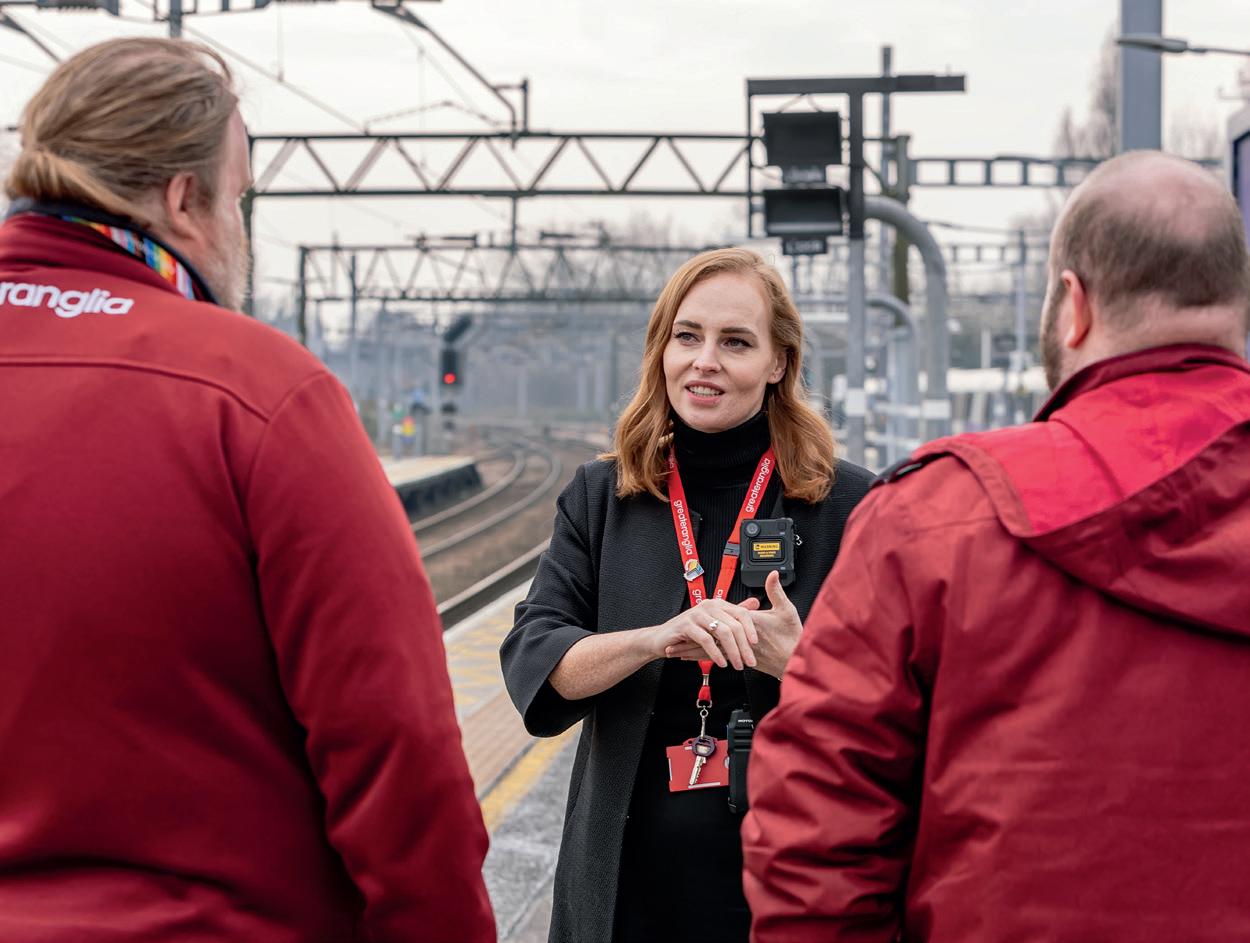
The Gold accreditation reflects GA’s strong commitment to investing in its people, aiming to support a motivated, skilled, and high-performing team dedicated to delivering excellence. For customers, the accreditation also means access to expert knowledge and best practices, as GA continually invests in training and development. A highly trained and engaged workforce translates into exceptional service, with staff who are not only knowledgeable but also genuinely committed to going the extra mile.
In addition, in 2024, GA was awarded Investors in People Gold status in recognition of its progressive approach to business improvement through its people. The organisation achieved the Gold Award, which demonstrates that they have gone beyond the requirements needed to achieve the standard Investors in People
status and have taken a forward thinking and expansive approach to cascading best practice through every level of the organisation. Only 28% of organisations achieve gold status and Greater Anglia was praised for leadership, collaboration, and communication with colleagues. Judges commended the train operator for supporting its workforce, delivering continuous performance, and creating sustainable success.
The IIP Gold accreditation reflects GA’s culture of continuous improvement. Benchmarked against the highest-performing organisations, GA remains focused on aligning its people management with business objectives to drive long-term success. While Gold is a significant milestone, GA is committed to further progress, striving towards Platinum accreditation - an achievement held by only 1% of UK firms.
Improving mental and physical health at all ages is crucial in boosting overall wellbeing to allow people to fulfil their potential.
Good health and wellbeing are often a precursor to a person being in a position to make the most of their talents and in work and feeling they can consider taking the next step in their career.
GA, as a train operator, has a unique industry responsibility when it comes to passenger safety and health. The organisation, critically, extends this focus to both community and colleague wellbeing as part of its wider agenda to break down the barriers to opportunity across its network.
Across the industry more widely, prioritising the health of employees is essential for maintaining high standards of safety and efficiency. When workers feel supported and healthy, they are more likely to perform at their best and take on new challenges, driving innovation and progress within the industry. By fostering a culture of wellbeing, organisations like GA can not only enhance individual lives but also strengthen the entire rail sector, ensuring it remains resilient and dynamic.
Safety is the first responsibility of a railway operator, both in terms of ensuring the wellbeing of customers and employees and minimising the impact of operations on wider society. Collaborating with partners such as Network Rail and Community Rail Partnerships (CRPs), GA is dedicated to raising awareness of rail safety issues and mitigating risks to the communities it serves.
One significant aspect of Greater Anglia’s community safety efforts is its collaboration with organisations like the Samaritans and the Railway Mission to raise awareness of support services for individuals facing challenges and personal concerns. By providing training and support, GA aims to prevent trespassing incidents and reduce instances of fatalities, thereby benefiting both directly and indirectly affected individuals. This is also applied to staff, with specific programmes dependent on employee role for trauma and stress management.
In line with this commitment, GA has trained a number of staff members with the Samaritans since 2012 and actively participates in events like ‘Brew Monday’ to promote connectivity and support networks. The appointment of a dedicated Safeguarding and Community Safety Manager, Georgia Payne, exemplifies the company’s focus on prioritising the safety of vulnerable individuals travelling across its network.
Safety is the first responsibility of a railway operator, both in terms of ensuring the wellbeing of customers and employees and minimising the impact of operations on wider society.
GA has also taken a number of practical measures, such as installing anti-trespass measures like additional fences and gates. It has also been proactive in its participation in initiatives like the Rail to Refuge scheme, which provides free train travel for survivors of domestic abuse - highlighting the business’ commitment to supporting those most in need in accessing essential services.
Moving forward, GA remains committed in its dedication to addressing community safety issues and ensuring the safety of railway users, workers, and affected communities. Through ongoing collaboration and proactive measures, the organisation continues to uphold its commitment to safety and wellbeing.
4.2.2. Championing Wellbeing Externally
GA is committed to promoting health and wellbeing not only within its workforce but also within the communities it serves. It actively engages in initiatives aimed at enhancing the wellbeing of its customers and the broader community.
For customers, GA goes beyond ensuring safe railway operations by actively advocating the benefits of train travel. Whether it’s commuting to work or enjoying leisurely journeys to coastal destinations, shopping hubs, or entertainment venues in London, train travel is promoted to improve overall wellbeing.
GA also collaborates with station adoptersvolunteers dedicated to improving the appearance of railway stations - creating more attractive gateways to local communities. These efforts not only provide volunteers with rewarding physical activity but also contribute to the wellbeing of customers, passersby and residents who benefit from improved station environments.
As an organisation, it is also committed to promoting biodiversity across its station network, as demonstrated through pioneering initiatives such as its Wildlife Friendly Stations accreditation scheme, developed in collaboration with the Norfolk Wildlife Trust. This initiative acknowledges and celebrates the efforts of station adopters in promoting biodiversity, enhancing the overall experience for rail users.
Community Rail Partnerships (CRPs) also play a vital role in promoting health and wellbeing through various activities and events. A wide range of these initiatives, including special ‘Dementia Trains’ and guided walks, offer positive experiences for individuals to enjoy and benefit from.
As mentioned previously, GA also extends its wellbeing support beyond its immediate stakeholders by partnering with organisations like the Samaritans to conduct suicide prevention and employee wellbeing interventions.

Prioritising the health and wellbeing of staff is a crucial linkage to all decisions GA undertakes as an organisation.
It seeks to foster a supportive and inclusive working environment by conducting regular check-ins with colleagues to acknowledge and support their health and wellbeing, whether they are facing professional or personal challenges.
Tailored support programmes are also in place to assist employees dealing with challenging situations at work, such as drivers involved in traumatic incidents while operating trains. GA also continuously evaluates and improves workplace conditions, layouts, and facilities to promote individual health and wellbeing among staff members.
These efforts are underpinned by a comprehensive policy agenda to support staff wellbeing, including menopause and family policies, stress management policies, and occupational health services.
GA also provides access to resources like the ‘Happi App’ to help employees manage work-life balance and overall wellbeing. It partners with organisations like Mind to address specific mental health challenges and collaborates with GP services to ensure employees have access to necessary healthcare.
These internal initiatives reflect GA’s commitment to creating a culture of support, inclusion, and wellbeing across the workforce.
4.2.4.
At GA, nurturing a culture of employee engagement is paramount, underpinning the commitment to fostering pride and wellbeing across its workforce. Regular communication channels are key components of this strategy, ensuring that supervisors and managers interact consistently with employees.
The communication agenda encompasses a range of channels, including weekly briefings, special updates, a quarterly magazine (GA Focus), online events, and an interactive intranet platform (Fuse) with social features. GA also holds periodic conferences and special events to facilitate gatherings of larger groups of colleagues.
In 2024 GA launched its new employee value proposition (EVP), The “Team Code”. The team code was developed based on insight, focus groups and developed on pre-existing company values, which creates the culture of positive change, ensuring that GA has consistent ways of working to grow and develop, and reminds all colleagues to always strive to be better. The team code has three main pillars around the areas of “Team spirit and we treat each other”, “Customer at the heart of everything” and “Future proofing our business”. All under the strap of line of “Giving People Greater Journeys” recognising the journeys for its customers and those journeys its colleagues have when working for GA.
To assess and continually improve the effectiveness of the engagement efforts, an annual Colleague Opinion Survey is conducted, ensuring anonymity to encourage candid feedback.
To assess and continually improve the effectiveness of the engagement efforts, an annual Colleague Opinion Survey is conducted, ensuring anonymity to encourage candid feedback. The most recent survey achieved its highest response rate yet, an impressive 73% with an engagement index of 81%. Survey results are meticulously analysed by function and location, empowering managers and team leaders to pinpoint areas for improvement and address raised concerns. Feedback covers various topics, including information dissemination, leadership styles, workplace conditions, and necessary equipment for job roles.
In response to survey outcomes, initiatives such as a ‘Your Voice’ event have been conducted to engage further with senior leadership on key issues, increased local engagement meetings, and an audit of internal communication activities to identify avenues for improvement. These initiatives outline the commitment to continually enhancing employee engagement and fostering a positive workplace culture at GA.
The organisation also runs a comprehensive mentorship programme for all colleagues to support their wellbeing and overall development. Critical to GA’s employee engagement is the production of localised Action Plans for employees, with group discussions amongst colleagues specific to their regionality feeding into the Action Plan. This long-standing practice is a key part of the colleague engagement and employee offering.
GA also operates an Employee Assistance Programme offering various avenues for assistance, including face-to-face counselling for all colleagues, with managers being proactive in referring colleagues to the programme.
Through these initiatives, Greater Anglia continues to demonstrate its commitment to employee wellbeing and engagement, fostering a supportive and inclusive workplace environment.
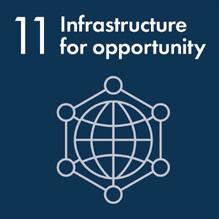
For communities with less opportunity on the doorstep, being able to get to opportunities where they are is absolutely essential.
That’s why investment in the roads and railways that connect people up with opportunities matters so much. It’s an enabler that can unlock people’s chances to go for roles that might not be on the doorstep but can turbocharge their careers. With the growing trend of hybrid working, both from home and in the office, it’s a real chance to lower the physical barriers to people being able to apply for jobs that aren’t on their doorstep.
Rail is critical to providing the link for individuals and communities to opportunity and GA is directly developing the innovative physical infrastructure that connects people and places to opportunity.
Improved transport infrastructure not only supports economic mobility but also fosters a more inclusive job market, ensuring everyone has the chance to succeed regardless of their location. This investment is key to creating a more equitable and dynamic workforce, bridging gaps between communities and opportunities.
4.3.1.
GA’s social impact agenda is characterised by an unwavering commitment to provide for customers with the highest quality train fleet to help deliver the highest quality of servicecontinuously striving to improve their experience. A well-functioning train service not only benefits individual passengers but also contributes to the prosperity of the entire region it serves.
During 2023/24, the transition to all services being operated by new trains was completed, revolutionising train services across East Anglia, with all customers travelling on high quality new carriages from 4 April 2023 onwards.
This is the first ever full fleet replacement undertaken by an individual train operator in UK history and is an important step not only for the organisation but for the entire industry.
Critically, these new trains include numerous improvements, including increased seating capacity, improved comfort, plug and USB points, free Wi-Fi, and improved accessibility features. Their superior acceleration, braking, reliability, and resilience have also contributed to delivering a more punctual service - a key priority for customers.
This, among other factors, has led to GA’s performance reaching historically high levels, with annual punctuality exceeding over 93% using the Public Performance measure and over 92% using the more stringent ‘Time to 3’ measure. These excellent performance levels have seen GA be the best performing train operator in the UK since April 2023. Given that punctuality and reliability have consistently been and remain the top priorities for rail service users in customer surveys, these achievements are highly significant and benefit the wider region and its economy too,
Significant investment has also been made in station upgrade schemes, often in collaboration with local authorities, and frequently focusing on integrated transport arrangements. Over £1 million has been invested in upgrading waiting shelters, toilets, and benches at rail stations across East Anglia. New waiting shelters have been installed, old ones replaced, and toilet facilities refurbishedimproving the overall station experience. Platform benches have also been upgraded, with old-style metal benches replaced by more comfortable timber ones, improving both comfort and aesthetics.
To maintain and continually increase customer satisfaction, GA upholds a comprehensive customer engagement agenda. This includes direct feedback monitoring, engagement with stakeholders, and regular review of customer feedback, plus an innovative “We’re all Ears” customer feedback survey which drives targeted, localised enhancements in line with customer priorities.
In addition, various measures, including the Service Quality Regime, continually assess areas such as train and station conditions and customer service. Collaborative efforts with stakeholders, including local authorities, rail user groups, and community rail partnerships, also help ensure alignment with local improvement priorities and customer needs.
In summary, GA’s customer satisfaction initiatives encompass a comprehensive strategy focused on continuous infrastructure improvement, ensuring that passengers receive the best possible service and experience throughout their journey.
4.3.2. Infrastructure Improvement and Regeneration
GA, acknowledging its role as an anchor organisation, collaborates closely with local authorities and business organisations to stimulate the local economy and contribute to regeneration efforts in priority areas. This support encompasses various initiatives, ranging from service transformations and station improvements to integrated transport solutions and specialised projects.
In terms of service provision, GA strives to offer frequent and reliable services throughout the week, including evenings and weekends, to facilitate travel to and from specific locations - boosting local economic activity. Station improvements also play a crucial role in this strategy, with efforts directed towards
improving station presentation and revitalising disused station buildings through projects and partnerships with station adopters.
Integrated transport links are also a key focus area, with investments made in cycle facilities, interchange arrangements, and collaboration with bus companies and local authorities to enhance connectivity at stations, promoting the sustainability of local businesses and enterprises.
GA is committed to improving service frequency on regional routes, particularly on Sundays and later in the evening, wherever practical, to facilitate greater access to local amenities and employment opportunities.
GA offers joint ticketing products, such as plusbus fares and special Jobseekers fares, to support local employment and facilitate access to opportunities. CRPs right across GA’s network also actively contribute to regeneration efforts by facilitating the reuse of station buildings and collaborating with local organisations to strengthen economic ties and promote tourism.
Partnerships with local authorities, business organisations, and CRPs extend to supporting local events and initiatives that align with local economic, tourism, and regeneration objectives. Examples include mural installations, additional train services for special events, and capacity improvements to accommodate local gatherings.
Through ongoing collaboration with local partners, GA remains committed to supporting regeneration initiatives and fostering economic growth in the communities it serves. The comprehensive and industry-leading fleet replacement undertaken since 2016 highlights GA’s dedication to meeting and exceeding evolving transportation needs - enhancing service standards across the region.
Building homes & sustainable communities 12
Communities that are safe, with a good quality of life and homes people can afford are communities that are sustainable in the long run. For communities that aren’t, they risk losing their talent and driving away the very opportunities from business investment that could transform their fortunes. It’s why placebased approaches matter so much, both from the government but also from businesses.
Responsible businesses, like GA, that harness their power as anchor institutions can help to provide and work towards sustainable communities, which exists as one of the major barriers to opportunity. By focusing on creating vibrant, affordable, and secure environments, we can retain and attract talent, fostering economic growth and resilience.
4.4.1. Social Inclusion
GA recognises the profound impact that train services have on local communities, influencing access to essential services, employment opportunities, and social activities. Through close collaboration with various organisations, GA aims to tailor its services to meet local needs and aspirations.
A key aspect of this effort involves consulting with local authorities, rail user groups, statutory rail watchdogs, and business organisations to shape timetable development. For instance, recent initiatives have focused on improving services to directly address customer or stakeholder aspirations or priorities - such as the return of 4 trains per hour, 7 days a week on the Stansted Express from December 2023 and, earlier in the same year, working with GTR to provide a better service from Kings Lynn and Ely in response to feedback from
local representatives. Additionally, adjustments have included both faster services between Norwich and London additional stops at Kennett in Suffolk introduced following input from local councillors.
GA has also appointed a Partnerships Manager to drive forward integrated transport and other partnership schemes to improve the railway and access to it. One joint workstream is an Integrated Transport Forum which serves as a platform for coordination between GA, local authorities, bus operators, transport organisations, and cyclist groups to optimise public and integrated transport links to and from stations. A Stakeholder Advisory Board also offers valuable insights into service priorities and actions to better align services with regional needs.
CRPs, including Essex and South Suffolk, New River, East Suffolk, Bittern, Wherry, Hereward, and a new Ipswich to Cambridge CRP, play a crucial role in addressing local service issues and organising initiatives to support specific communities and groups. For instance, initiatives such as special trips for refugees and disadvantaged families, as well as events like ‘Warm-Up Wednesdays’ contribute to fostering community cohesion and addressing social isolation.
GA also maintains partnerships with organisations like the Maldon and District Community Voluntary Service, these have led to innovative projects such as establishing the first Men’s Shed in England at the Southminster station, aimed at combating loneliness and isolation.
Volunteer Station Adopters and local staff consistently provide valuable insights into local issues, which inform timetable adjustments and support for local events. Special initiatives, including charity collections at stations, further demonstrate GA’s commitment to supporting social inclusion and community wellbeing.
GA remains dedicated as a local leader to fostering social inclusion across its network by engaging with stakeholders, tailoring services to local needs, and implementing initiatives that contribute to building sustainable and vibrant communities.

4.4.2.
As a responsible and socially conscious organisation, GA has made a commitment to sustainable and regionalised procurement. This is evident in its efforts to source supplies and products locally wherever feasible, contributing to the resilience and vitality of the communities served.
A leading illustration of the organisation’s localised procurement approach is evident in the onboard catering services, where most products are procured through Anglia Culinary Services in Norwich, alcoholic beverages sourced from Lacons Brewery in Great Yarmouth and Adnams of Southwold, Kettle Chips crisps manufactured in Norwich, and cakes supplied by Sponge in Holt.
Similarly, for marketing and design services, the company engages with local agencies such as DMC in Southend for design and print, the Fountain Partnership in Norwich as its digital agency, and Atomic in London for advertising and campaigns. Social media promotion is entrusted to Once Upon a Time in London, podcast production to Fresh Air in London, and influencer marketing to Fluential from Kings Lynn.
In terms of PR, media relations, and stakeholder relations, collaborations are in place with Lantern PR from South Norfolk for comprehensive media and stakeholder support, alongside Electric Airwaves in London for media training. Photography services have been sourced from Nick Strugnell Photography in Colchester, while videography services have been provided by Anne Gould, also based in Colchester.
GA’s commitment to supporting local businesses extends beyond procurement to event hosting and community engagement. The annual community rail conference and Station Adopters’ awards are held within the region, often at Ipswich Town Football Club. Collaborations with local entities like Cyclelinks in Norwich and the local chamber of commerce in Sheringham further reinforce the dedication to local community support.
Through initiatives like the previously mentioned Wildlife Friendly Stations accreditation scheme - initially set up with Norfolk Wildlife Trust - GA strives to promote environmental sustainability while engaging local stakeholders and businesses. Railscape, based in Rayleigh, Essex, also undertakes station landscaping and maintenance work, supporting Station Adopters and enhancing station environments.
CRPs across its network actively involve local suppliers in their activities. For instance, the Essex and South Suffolk CRP collaborates with local builders’ merchant Silvertons, Fastsigns in Chelmsford, and hardware stores in Clacton and Dovercourt, fostering a network of local engagement and support.
GA’s procurement strategy prioritises sustainability and bolsters the local economy, with many of its suppliers and retailers sourcing their supplies from within the region. This approach underpins the business’ wider commitment to breaking down barriers to opportunity through a commitment to building sustainable communities and fostering local prosperity.
As mentioned previously, GA has established itself as a frontrunner in promoting CRPs across its network, contributing significantly to the development of sustainable communities and the improvement of local railway lines often neglected. These local lines hold significant importance for their respective communities, prompting GA to collaborate closely with stakeholders to improve stations and services through CRPs.
GA’s work with CRPs has involved increased collaboration between local authorities and train operators, often bridging funding gaps, and frequently initiating improvements in services, stations, and community connections. Since 2016, GA has substantially expanded its involvement, establishing new CRPs across Essex, Norfolk, Suffolk and Cambridgeshire.
While many CRPs see significant support from local authorities, GA is usually the largest funder due to resource constraints faced by these organisations. In 2016, at the onset of its franchise, GA doubled core funding for existing CRPs, allocated funds for new CRPs, and made various commitments to bolster their impact. Subsequently, in 2017, GA published its inaugural Community Rail Report, outlining its strategy publicly and fulfilling its franchise obligation to provide an annual community rail report.

GA’s proactive approach to community rail development is evident in the way it doesn’t just fulfil its obligations as outlined in its National Rail Contract but actively seeks to drive forward the community rail approach. It seeks to deliver on the Secretary of State’s Community Rail Strategy, collaborate closely with the Community Rail Network (CRN), supports CRP development and plays an active role in the national Community Rail Steering Group. Joint working with CRN representatives also provides opportunities to discuss CRPs’ aims, needs, and funding requirements and share/receive best practice ideas.
Financially, GA allocates core funding annually to CRPs, demonstrating its commitment to sustaining these partnerships. For the year 2025-26, GA allocated core funding to CRPs across various lines, including Community Rail Norfolk, East Suffolk Lines, Essex and South Suffolk, Hereward, the New River Line and the new Ipswich to Cambridge CRP.
GA’s dedication to prioritising community rail is highlighted by high-level discussions within the company, actively championing community rail initiatives. With GA’s unwavering commitment, CRPs and Station Adopters continue to drive positive momentum, significantly contributing to the vitality and sustainability of local communities across GA’s network.


4.4.4. Station Adoption Scheme
GA has demonstrated a profound organisational commitment to sustainability through its Station Adoption Scheme, fostering community engagement and environmental stewardship.
Established over twenty years ago, the scheme boasts 130 stations adopted and over 335 volunteers, known as station adopters, who dedicate their time to improving railway stations for the benefit of local communities.
One significant outcome of this scheme is the marked increase in green space within and around stations, with GA conducting a biodiversity audit to track progress. The total area of station gardens across the network has expanded over 50% in recent years. This expansion has not only improved the look and feel of the stations but also created wildlife-friendly environments, contributing to local biodiversity.
Volunteers within the Station Adoption Scheme have played a pivotal role in transforming railway
land into wildlife havens. Despite challenges posed by the pandemic, volunteers tended to over 6,400 square metres of railway land in 2020 alone (now over 10,000 sq. m.), installing numerous insect houses and bird boxes. This effort aligns with Bug Life’s findings, which highlight the importance of transport corridors like railways in providing safe habitats for pollinators and other wildlife, thereby preventing habitat loss and supporting biodiversity.
GA’s commitment to sustainability extends beyond the Station Adoption Scheme. On the back of the scheme, the business has pledged to make stations across Britain more sustainable, guided by the industry’s Sustainable Stations: Best Practice Guide. This pledge highlights GA’s dedication to decarbonisation, waste reduction, and support for local wildlife. By working with station adopters and partnering with organisations like Wild East, GA has now pledged over 10,000 square metres of rail station land with a total of 68 gardens to contribute to the region’s wildlife conservation efforts.
NWT, in collaboration with GA, has initiated the Greater Anglia Wildlife Friendly Stations Accreditation Scheme, aimed at creating wildlife havens across the network.
The impact of GA’s Station Adoption Scheme has garnered recognition from various organisations, including the Norfolk Wildlife Trust (NWT). NWT, in collaboration with GA, has initiated the Greater Anglia Wildlife Friendly Stations Accreditation Scheme, aimed at creating wildlife havens across the network. This scheme, piloted at stations in Norfolk, but now in place at 40 stations across the GA network, assesses stations’ support for local flora and fauna, providing valuable insights and guidance for enhancing wildlife-friendliness.
Through the dedication of volunteers and partnerships with conservation organisations, GA’s Station Adoption Scheme continues to transform railway stations into thriving wildlife habitats. With a focus on sustainability and community engagement, GA is not only fostering environmental stewardship but also building stronger, more resilient communities across its network.
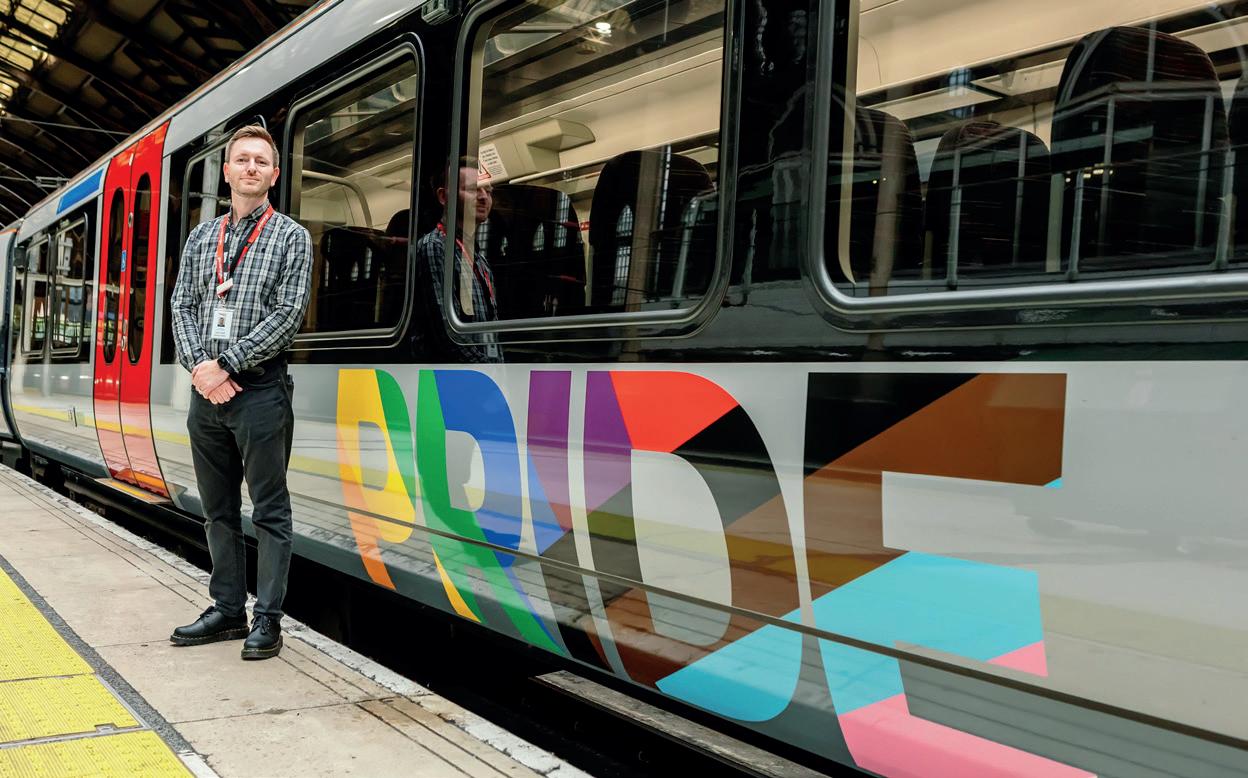
Opportunity for all: Everyone everywhere
4.5. Goal 14 - Achieve Equality through Diversity and Inclusion
Creating a level playing field for all has the potential to fully unleash Britain’s potential for the first time.
Diversity extends beyond gender and ethnicity to sexuality, disability and other challenges that can lead to disadvantage. When we look across the leadership roles in business, the judiciary, government and politics, there is a continued skew towards those from the most privileged backgrounds. Britain will not succeed unless and until its leadership roles, wherever they are found in our society, better reflect the wider society at large.
Ensuring equal opportunities within the rail sector means embracing a broader spectrum of experiences and perspectives, which can drive innovation and foster more inclusive decisionmaking. By breaking down barriers and promoting diversity, we can build a stronger, more resilient Britain that truly harnesses the talents of all its people, contributing to the overall prosperity and connectivity of the country more widely.
GA is an employer of over 3,000 employees and operates and serves a diverse range of communities across a significant footprint. Its approach to equality, diversity and inclusion is critical to its employees – as represented in its recent DEI Action Plan 2025/26 - but also to the wider community and Britain as a whole.
4.5.1. Proactive Recruitment
GA is proactively fostering equality through diversity and inclusion, particularly in its recruitment practices. Through a comprehensive agenda, GA prioritises open, fair, and proactive inclusive recruitment strategies.
In this area, GA has recently developed its Inclusive Recruitment Training Programme tailored for hiring managers. This programme equips managers with the necessary skills and knowledge to conduct recruitment processes fairly and supportively, irrespective of an individual’s background.
GA has also taken significant strides in transforming the language used in external adverts and job postings to ensure maximum inclusivity. By employing inclusive language, GA aims to attract a diverse pool of candidates and create a welcoming environment for all applicants.
As part of its ongoing efforts to enhance recruitment practices, GA actively gathers feedback from all new starters during the onboarding process. This feedback mechanism allows GA to continuously evaluate and refine its recruitment processes, ensuring they remain aligned with the organisation’s values of equality, diversity, and inclusion.
Through these proactive measures, GA strives to build a workforce that reflects the diversity of the communities it serves.
Stansted Express trains feature low floors and retractable steps, facilitating level boarding at most stations they serve.
4.5.2. Championing Accessibility
As a lead transport operator, GA is dedicated to ensuring all its passengers can travel freely and happily on its services, championing accessibility as part of its broader commitment to achieving equality through diversity and inclusion.
The organisation adopts a proactive approach to ensure the railway is accessible to all groups, with a focus on making trains, stations, and services more accommodating.
A significant feature of GA’s accessibility initiatives involves providing step-free access throughout stations by replacing stairs with ramps and lifts. These enhancements are complemented by improvements in lighting and station aesthetics to cater to individuals with visual impairments.
GA’s commitment to accessibility is further evidenced by its ongoing station upgrades, ranging from major projects such as additional entrances and new lifts to smaller-scale initiatives like assistance meeting points and floor vinyls indicating buggy size allowances. GA also actively participates in national schemes supporting accessible travel, including the provision of information cards for customers with assistance dogs and the sunflower lanyard scheme for customers with non-visible disabilities.
Central to GA’s accessibility agenda is the completed rollout of a new fleet of trains, representing a substantial £1.4 billion investment programme. This initiative replaced every train with new models by the spring of 2023, with the new trains designed to be significantly more accessible, brighter, and user-friendly than their predecessors. Notably, regional bi-mode, intercity, and Stansted Express trains feature low floors and retractable steps, facilitating level boarding at most stations they serve. This transformative approach sets a benchmark for future rail network infrastructure across Britain
To ensure continuous improvement in accessibility, GA relies on the expertise of its Accessibility Manager and an Accessibility Panel comprising individuals with lived experience of various accessibility issues. These stakeholders guide GA in shaping its accessibility plansfacilitating further progress.
GA also prioritises employee training on key accessibility issues as part of their induction process. It also offers a dedicated training programme that increases colleagues’ awareness of diverse customer needs and equips them with the skills to provide optimal support. The training is delivered by a trainer with firsthand experience of accessibility requirements, ensuring its relevance and effectiveness.
As an organisation, GA recognises the importance of information provision in empowering customers to make informed journey choices. It has developed online virtual tours for 19 major stations, allowing customers to familiarise themselves with station layouts and facilities, with plans underway to provide similar guides for onboard train facilities.
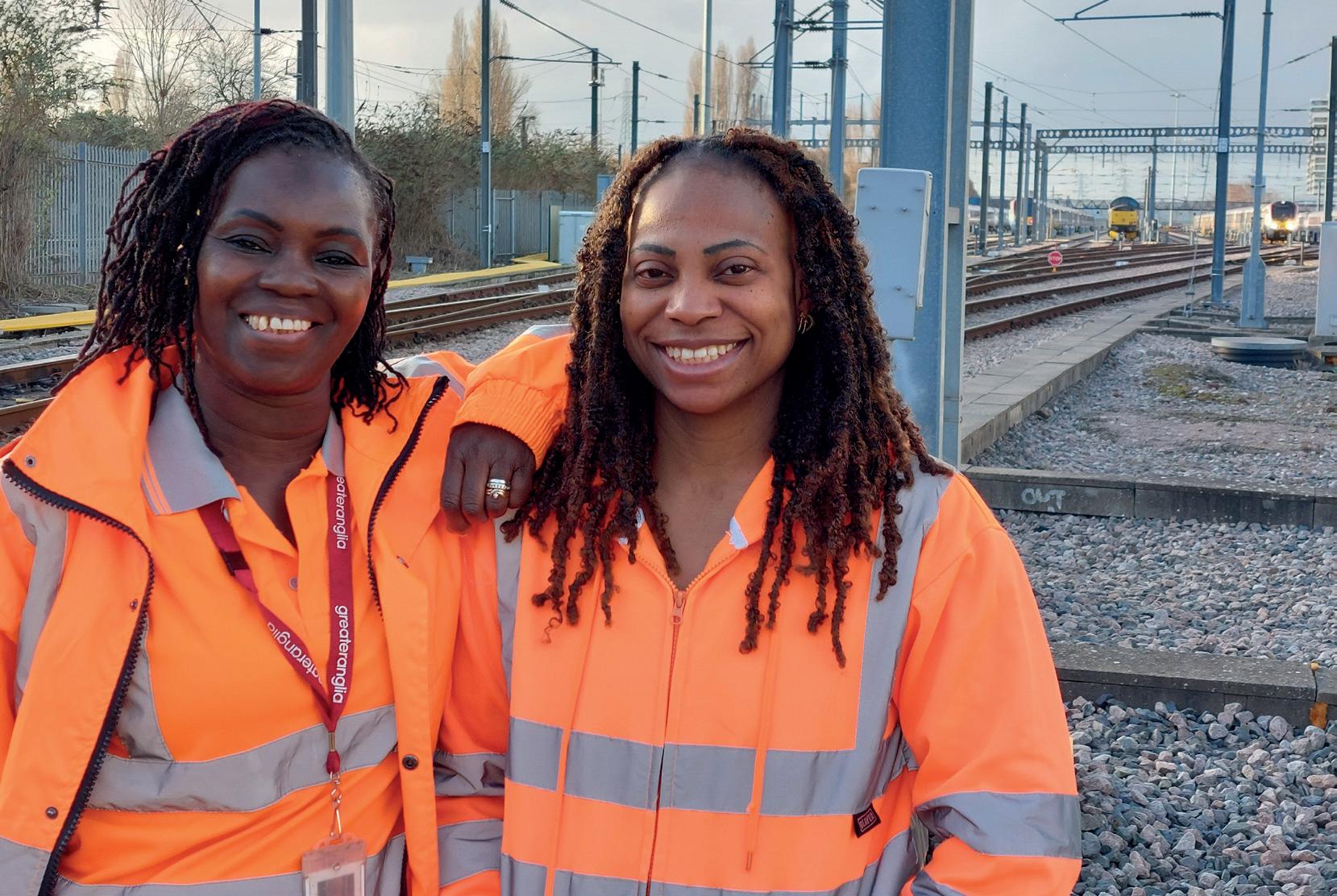
4.5.3. Leading on Diversity and Inclusion
As a large-scale employer of over 3,000 employees, GA takes a national leadership position on diversity, equity and inclusion (DEI), guided by a robust DEI Action Plan for 2025/26. With a structured approach, GA divides its efforts into six pillars: Engage, Equip, Empower, Embed, Evaluate, and Evolve. These pillars include various goals, actions, and success measures, each with clear ownership, ensuring GA remains accountable and progresses towards its DEI objectives.
A critical feature of GA’s ED&I strategy involves talent attraction, particularly targeting underrepresented groups to foster a diverse workforce. GA is currently reviewing its Talent Attraction Strategy, aiming for a fair and open recruitment process that actively recruits individuals from diverse backgrounds. Notably, GA’s initiatives extend to encouraging more women to pursue operational roles, such as train drivers. Through events like Female Driver Day, GA aims to demystify preconceptions surrounding traditionally male-dominated roles, resulting in a notable increase in applications from female participants.
Recognising its efforts, GA has been endorsed as an Employer for Women by WORK180, underpinning its commitment to supporting women in the workplace. This endorsement aligns with GA’s aim to create an environment that empowers women and attracts top talent, further cementing its position as a leader in diversity and inclusion within the UK.
In line with its commitment to inclusion, GA, as mentioned previously, continuously improves its recruitment practices, collaborating with external experts to attract and recruit diverse candidates reflective of the communities it serves. This includes measures such as using diverse job board platforms, reviewing language in adverts and application templates, and anonymising CVs and applications through the e-recruit system. GA also actively monitors new entrant diversity statistics, focusing on gender, age, and ethnicity across departments and geographical locations.
4.5.4. Fostering an Inclusive Culture
GA acknowledges the importance of an inclusive culture that celebrates diversity and empowers every individual within the organisation.
As part of its broader initiatives, GA has introduced the ‘Greater Together’ training programme aimed at nurturing an inclusive workplace environment. This programme is complemented by a series of Employee Engagement events dedicated to promoting inclusion and support across the business. An upcoming EDI-focused hackathon is in the pipeline, providing colleagues with a platform to offer feedback on policies, ensuring that GA’s practices resonate with the diverse needs of its workforce.
A pillar of GA’s efforts in fostering inclusion lies in its robust tracking system, which monitors colleague data and facilitates reasonable adjustments tailored to individual departments. GA also tracks responses to its external communications to identify areas for improvement and better targeting, demonstrating the priority awarded to continuous improvement across the organisation.
GA has also established a number of Employee Network Groups to provide safe spaces for open conversations and support networks. ‘Affinity’, the Sex and Sexuality Group, champions diversity and inclusion year-round by creating a culture of acceptance and celebration. Affinity strives to ensure that every individual feels valued, seen, and heard, fostering an environment where authenticity is embraced. This is displayed through the organisation running both Pride and Black History Month-liveried trains.

Similarly, the Ethnicity and Culture Group at GA aims to create an inclusive environment where everyone feels recognised and respected. This group fosters connections, promotes education about diverse backgrounds, and encourages conversations that facilitate understanding and growth.
GA recognises the importance of representation and actively involves Network Chairs in its EDI committee to ensure that their voices are heard in policy discussions and broader conversations. This collaborative approach allows the groups to discuss ideas and provide valuable input to the Board of Directors, reinforcing GA’s commitment to inclusion at all levels of the organisation as a critical aspect of its wider colleague offering.
GA also relaunched its ‘Up’ Network Group on International Women’s Day 2024, reaffirming its dedication to supporting female colleague development and empowerment.
GA acknowledges the importance of an inclusive culture that celebrates diversity and empowers every individual within the organisation.
GA’s concerted efforts to foster an inclusive culture underscore its commitment to creating a workplace where every individual feels valued, respected, and empowered to thrive. Through initiatives like the ‘Greater Together’ programme and Employee Network Groups, GA is paving the way for a more inclusive future, one that celebrates diversity and champions equality for all.
Moving forward, through the establishment of this Breaking Down Barriers to Rail Impact Report – GA has displayed its continued commitment to social impact, and its desire to go even further in delivering equality of opportunity for its passengers, its colleagues, and the communities it serves on its network.
In this next section, the areas with the widest and highest barriers to opportunity across the GA footprint have been strategically assessed in an effort to target and analyse where the organisation could go even further in delivering for its diverse community and passenger-base.

5.1.
Waveney is one of the areas in the UK with the highest barriers to opportunity. It is rated 318th out of 324 Local Authorities across the UK by key social mobility indicators.
Waveney scores best in its Early Years indicators, ranking 156th out of 324. It is also ranked in the lower-middle of districts in its Youth indicators at 234th out of 324.
However, it ranks 323rd out of 324 districts in School year indicators, representing a potential area for GA to up-scale its already industryleading school outreach agenda. GA’s number and range of roles and pathways could also benefit a similarly ranked indicator, Adulthood, with Waveney ranking 288th out of 324 districts in the UK.
Percentage of Nursery providers rated outstanding or good by Ofsted
Percentage of children eligible for free school meals achieving a good level of development
Percentage of children eligible for FSM attending a primary school rated outstanding or good by Ofsted
Percentage of children eligible for FSM achieving at least the expected level in reading, writing and maths at the end of Key Stage 2
Percentage of children eligible for FSM attending a secondary school rated outstanding or good by Ofsted
Average Attainment 8 score for pupils eligible for FSM
Percentage of young people eligible for FSM that are not in education, employment or training (positive destination) after completing KS4
Average points score per entry for young people eligible for FSM at age 15 taking A-level or equivalent qualification by the age of 19
Percentage of young people eligible for FSM at age 15 achieving two or more A-Levels or equivalent by the age of 19
Median weekly salary of all employees who live in the local area
Average house prices compared to median annual salary of employees who live in the local area
Percentage of people that live in the local area who are in managerial and professional occupations
Percentage of families with children who own their home

5.2. Breckland
Breckland is bottom ten percentile across key social mobility metrics, ranking as the 306th out of 324 Local Authorities districts in its barriers to opportunity at key life stages.
Breckland is ranked well across key Early Years indicators, 83rd out of 324 districts – in the top 30% of the UK. It is also ranked averagely nationwide in Youth age indicators, 212th out of 324.
Breckland’s ranking across School and Adulthood age indicators, 309th and 318th out of 324 respectively, represent target areas for GA to up-scale its approach to breaking down barriers across its network.
Breckland is ranked well across key Early Years indicators, 83rd out of 324 districts – in the top 30% of the UK.
Percentage of Nursery providers rated outstanding or good by Ofsted
Percentage of children eligible for free school meals achieving a good level of development
Percentage of children eligible for FSM attending a primary school rated outstanding or good by Ofsted
Percentage of children eligible for FSM achieving at least the expected level in reading, writing and maths at the end of Key Stage 2
Percentage of children eligible for FSM attending a secondary school rated outstanding or good by Ofsted
Average Attainment 8 score for pupils eligible for FSM
Percentage of young people eligible for FSM that are not in education, employment or training (positive destination) after completing KS4
Average points score per entry for young people eligible for FSM at age 15 taking A-level or equivalent qualification by the age of 19
Percentage of young people eligible for FSM at age 15 achieving two or more A-Levels or equivalent by the age of 19
Median weekly salary of all employees who live in the local area
Average house prices compared to median annual salary of employees who live in the local area
Percentage of people that live in the local area who are in managerial and professional occupations
Percentage of families with children who own their home

Greater Anglia’s approach to breaking down the barriers to opportunity reaches much further than its immediate operations. It is proactive and focused, delivering for its passengers, colleagues, and wider communities and regions in a number of key areas.
As has been outlined throughout this report, purpose-led rail operators can deliver comprehensive social dividends.
In particular, Greater Anglia’s opportunity agenda is epitomised through the delivery of inclusive pathways to opportunity across the organisation, its priority of health, wellbeing and safety for all, the creation of opportunity through leading infrastructure and connectivity, and the building of sustainable communities.
6.1. Inclusive Pathways to Opportunity GA is committed to providing diverse pathways into the organisation, as highlighted through
mapping the organisation against Purpose Goal 3 - Positive Destinations Post 16+.
GA recognises the importance of offering a number of choices in career paths, ranging from direct employment opportunities to apprenticeships. By offering a range of professional roles and embracing diversity in recruitment practices, GA ensures inclusion and caters to varied skillsets and interests.
Critically, it begins this work early. Through early careers outreach, partnerships with organisations like Future Frontiers, and structured study programmes – GA empowers individuals to transition from school years into meaningful employment opportunities.
Its school and college-year outreach are underpinned by GA’s Traineeship Programme, Industrial Placements, and Supported Internships, further underlining the organisation’s dedication to inclusion and career development at every stage.
Rail travel is critical to connecting people up to opportunity.
Underpinning GA’s approach to social impact is an understanding that the health, wellbeing and safety of its passengers is the priority of rail operators and should be a given. It therefore holds itself to high standards as an organisation and is aligned with Purpose Goal 8 – Good Health and Wellbeing.
Centrally, the organisation extends its focus to encompass not only immediate passenger and employee safety, to community wellbeing – collaborating with partners to raise awareness of rail safety issues and implement measures to mitigate risks.
GA’s initiatives encompass proactive collaborations with organisations like the Samaritans and the Railway Mission to prevent trespassing incidents and reduce fatalities. It takes these learnings and applies it across the organisation, ensuring staff are well equipped to support passengers in every situation they may encounter.
Externally, GA champions wellbeing across the industry - advocating for the benefits of train travel and engaging in initiatives to improve the wellbeing of its customers and communities.
Internally, GA fosters a supportive and inclusive working environment. It prioritises employee health and wellbeing through tailored support programmes, comprehensive policies, and access to leading mental health services and wider resources.
Rail travel is critical to connecting people up to opportunity. GA recognises how important its role is across the communities it serves and is committed to break down the barriers to opportunity through its work and leadership against Purpose Goal 11 - Infrastructure for Opportunity.
Recognising the pivotal role of transport, particularly Britain’s historic railways, in connecting people with opportunities, GA is leading in its investment in innovative physical infrastructure to facilitate access to education, employment, and services.
The organisation’s customer-focused approach focuses on delivering the highest quality of service through a UK-first full comprehensive fleet modernisation, station upgrades, and extensive customer engagement.
GA also collaborates closely with local authorities and business organisations to stimulate the local economy and contribute to regeneration efforts, supporting localised economic growth and improving connectivity in the communities it serves.
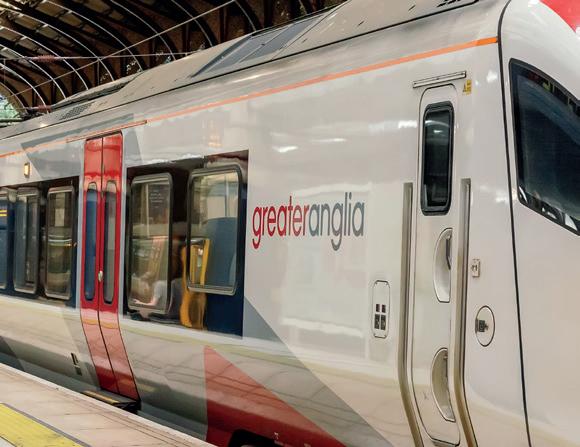
On top of the providing critical infrastructure connecting people to opportunity, GA embraces its role as an anchor institution across the region. It embraces a place-based approach to promote social inclusion, reduce emissions, support local procurement, and empower local stakeholders, as outlined in work against Purpose Goal 12 - Building Sustainable Communities.
This includes collaborative efforts with local authorities, rail user groups, and business organisations – ensuring that services are tailored to meet local needs and aspirations.
GA’s organisational commitment to reducing emissions includes quantifying and mitigating carbon emissions across all operational activities and promoting sustainable travel choices among passengers. The organisation also prioritises sourcing supplies and products locally to contribute to the resilience and vitality of the communities served.
Its approach to community is underpinned by a leading community engagement agenda. This includes initiatives including Community Rail Partnerships and leadership on the Station Adoption Scheme – each aimed at empowering local community members to drive positive change, foster environmental stewardship, and promote community connection.
Across its operations, GA is committed to continually working towards and embedding equality through an underpinning focus on diversity and inclusion, as outlined in its work against Purpose Goal 14.
Recognising the importance of creating a level playing field for all as a major regional and national employer, GA embraces diversity in its broadest sense and adopts a structured approach guided by pillars such as Engage, Equip, Empower, Embed, Evaluate, and Evolve.
These pillars focus GA’s proactive approach towards the employee journey. It seeks to foster inclusive recruitment practices, with supportive programmes to ensure continual development and feelings of inclusion and belonging once within the organisation.
GA’s efforts to foster an inclusive culture also include strategic training schemes, employee network groups, and robust tracking systems to monitor colleague data and facilitate reasonable adjustments.
Externally, GA is keenly focused on championing and delivering accessibility for all across its stations and fleet, instilling a focus on continual improvement measures across its network to best suit all passengers.
GA’s efforts to foster an inclusive culture also include strategic training schemes, employee network groups, and robust tracking systems to monitor colleague data and facilitate reasonable adjustments.
The final section outlines recommendations and next steps for GA as it seeks to enhance still further its positive impact across its network.
Summary
This report has set out how Greater Anglia (GA) has been delivering a significant and positive social impact across the areas it serves, in every aspect of the way it runs services in East Anglia, from the quality of service it provides to the connectivity, accessibility and opportunities those services offer and the areas of the region where it may be able to achieve even greater social impact and help support greater inclusion and sustainable development. With that in mind, the final section outlines recommendations and next steps for GA as it seeks to enhance still further its positive impact across its network.

This Impact Report has explored GA’s wideranging social impact – as displayed through its best practice in breaking down the barriers to opportunity for its colleagues, its passengers, and the communities it serves.
The organisation’s partnership with the Purpose Coalition, and assessment against the Purpose Goals, is an acknowledgement of not only the sector-leading activity already underway, but of the potential to go even further utilising strategic learnings throughout this report.
The recommendations set out here operate as achievable but ambitious next steps for GA in its continued focus on breaking down the barriers to opportunity.

7.1.1 Strengthening community rail
GA’s collaboration with Community Rail Partnerships (CRPs) and station adopters plays a key role in embedding rail within local communities. To further develop this approach, GA has committed to:
Continuing to work with CRPs to expand community-led initiatives where access to opportunity is more limited. Other CRPs across the UK have successfully introduced rail confidence workshops, mental health initiatives, and local business incubators at stations - demonstrating the wider potential of these partnerships.
Continue to support station adopters to develop local projects that strengthen rail’s role in communities.
Heritage preservation, creation of green spaces, local pop-up markets, and community art installations have proven effective in making stations more welcoming and relevant to local people.
Increase collaboration with local authorities and social enterprises to explore the potential for repurposing underused rail spaces This could include disused station buildings, for community hubs, co-working spaces, or local training centres.
7.1.2 Improving social mobility in low-opportunity areas
GA serves a wide range of communities, including some of the least socially mobile areas in the UK. Working strategically with partners, it can help address local inequalities by:
Focusing youth engagement initiatives on areas with lower education outcomes where school-age social mobility indicators rank among the lowest in the country, including:
• Extending school outreach programmes to ensure more young people are aware of career pathways in rail.
• Supporting educational rail initiatives, including offering guidance sessions for students from low-income backgrounds to improve access to training and employment.
• Providing tailored work experience placements, following models used successfully by Southeastern Railway, which has built pathways for underrepresented students through The Purpose Coalition’s Purpose Lab project.
Strengthening engagement in skills development for adults where employment barriers are more pronounced. This will include:
• Developing pre-employment training programmes in partnership with local training providers.
• Advocating for improved community transport links to better connect jobseekers with key employment hubs.
7.1.3 Expanding accessibility & inclusive travel
GA has already made important progress in accessibility, and is committing to a number of measures to strengthen its position as an industry leader in travel for all:
• Running further ‘Try a Train’ days to support disabled passengers, elderly travellers, and those with learning difficultie in building confidence in using rail services. Other operators have seen strong results from this approach.
• Up-scaling staff training on accessibility by working with disability advocacy groups to ensure passenger needs are fully understood and met.
• Using the Sunflower Lanyard, raising awareness of priority seating and ensuring staff and passengers are more informed about non-visible disabilities.
• Advocating for flexible transport solutions in rural areas, where communities may have limited access to public transport, making it easier for people to connect to rail services.
GA has already made important progress in accessibility
7.2.1 Expanding apprenticeships & career development
Apprenticeships and career pathways provide a vital route into the rail industry. GA has committed to go even further in its approach by:
• Extending outreach into communities with lower employment rates, ensuring apprenticeship opportunities reach underrepresented groups.
• Continue to provide clear pathways from apprenticeships into permanent employment, ensuring participants have structured progression routes.
• Offering mentoring and coaching, particularly for young recruits and those from disadvantaged backgrounds, to increase long-term retention.

7.2.2 Strengthening diversity & inclusion strategy
GA has established a comprehensive DEI plan, and further steps can embed inclusion across the workforce:
• Tracking socioeconomic background data to ensure recruitment and career progression policies support individuals from all backgrounds, working with The Purpose Coalition to implement four simple questions to track the intersectional background of all colleagues.
• Using Employee Network Groups to provide input on inclusive hiring policies, ensuring that a diverse range of perspectives shape workforce development.
• Strengthening targeted recruitment efforts, focusing on encouraging more women, ethnic minorities, and people living with disabilities into strategically designed operational rail roles, building on successful industry initiatives.
7.2.3 Employee wellbeing & mental health support
GA understands and prioritises wellbeing as critical to staff retention and job satisfaction. It can continue to evolve its support framework by:
• Ensuring mental health first aiders are available at all major stations, allowing for immediate support for employees and passengers.
• Expanding flexible working arrangements, where possible, to support employees balancing personal and professional responsibilities.
• Providing specialist trauma support for frontline staff, particularly those involved in challenging incidents.
7.3.1 Strengthening procurement & Scope 3 carbon reporting
GA’s approach to sustainability and responsible supply chains is well-established.
To build on this, it has committed to:
• Develop a strategy to measure Scope 3 emissions, ensuring greater insight into indirect environmental impact across the supply chain.
• Engage suppliers on social value ommitments, encouraging partners to focus on:
- Local employment and skills training. - Sustainable and ethical sourcing. - Diversity and inclusion in their workforce.
• Work with small and medium-sized enterprises (SMEs) in its supply chain, supporting local businesses while enhancing social impact.
7.3.2 Aligning infrastructure investments with impact
GA has made substantial progress in modernising its network. To ensure future developments maximise social value, GA will:
• Use data-driven insights to optimise service accessibility, particularly in areas where transport gaps could create employment barriers.
• Engage local communities in shaping station upgrades, using co-design principles to ensure improvements align with passenger needs.

7.3.3 Improve impact reporting & transparency
To strengthen its position as a leader in social value, GA will:
• Publish an annual Breaking Down Barriers Impact Report, tracking progress in employment, accessibility, and sustainability.
• Continue to use independent audits and evaluation tools, such as the Rail Social Value Tool (RSVT), to quantify and communicate social benefits.


The Purpose Coalition campaign is proudly run by This is Purpose, part of Crowne Associates. Copyright © 2025. Crowne Associated Ltd is a corporate affiliate member of the Chartered Institute of Public Relations, and reports lobbying activities to The Office of the Registrar of Consultant Lobbyists, in line with the Transparency of Lobbying, Non-Party Campaigning and Trade Union Administration Act 2014. You can read our Code of Conduct at crowneassociates.uk/code-of-conduct.